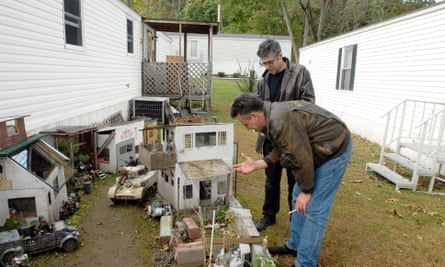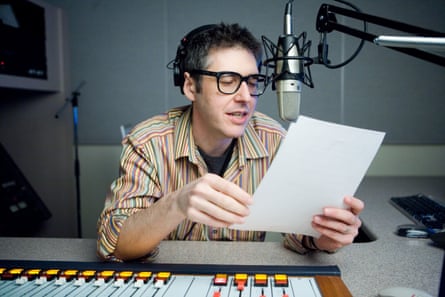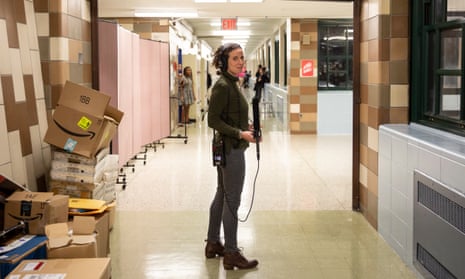Speaking to Ira Glass over Zoom is a slightly befuddling experience. His unique voice and speaking style, intensely conversational with lots of pregnant pauses and rising inflections in unlikely places, is now so recognisable that it is easy to think you’re actually listening to an episode of his show.
We are talking because this month marks 25 years since Glass founded This American Life, the programme his voice has become synonymous with. Initially dreamed up as a storytelling showcase for Chicago audio artists and new writers, it now regularly wins awards – including one Pulitzer – for its in-depth international reporting, and boasts several spinoffs, among them the hit podcast Serial. Glass is one thing that has remained constant, his repeated bits of introductory patter (“Each week on our programme we choose a theme …”) the closest thing public radio has to a catchphrase.
Yet the show – which now has 2.2 million listeners a week, with a further 3.1 million downloading the podcast – was born out of Glass’s discomfort with how he sounded on air. In 1995, he was working for National Public Radio as a producer. He wanted more airtime, but thought he was a weaker interviewer than a producer. So he took a step back and, with a few friends, started a show called The Wild Room on a local Chicago station.

“I would try to tell a story live on the air,” he says, “and bring in quotes, music, everything live – trying to tell the story to the other person in the studio. It was a way of practising being myself,” he says. “I wanted to do a documentary story that allowed for different colours: something funnier, more emotion, using the music as a kind of score in a film. All of that was a conscious departure.”
Those early live experiments led to the creation of Your Radio Playhouse, the show that would become This American Life. One of the first people Glass hired was Nancy Updike, who has worked on TAL ever since. “The first week, it was mayhem,” she says. “Four people putting together a live show we invented that week. But it was thrilling.”
The show sounded more in your face back then. Updike recalls one of the first stories she worked on, about how she and her young Irish boyfriend weren’t using condoms because they were no longer scared of Aids. There were pieces by audio artists, too, and young writing talent. Such emerging non-fiction writers as David Sedaris became regular contributors. “There was a, ‘Let’s put on a show!’ feel,” Sedaris says. “It made a real impact on my career, and taught me about writing for radio: not to overcrowd the stage – a listener’s head – with characters. Mentioning four names in your first sentence is OK in a book, but not on the radio, where people can’t turn back thinking, ‘Now which one is Martin?’”
Over time, the show started to grapple with bigger subjects: private contractors in Iraq, segregation in US schools, Donald Trump’s immigration policies. Two developments supercharged its success globally. The first was a seemingly minor distribution decision made in 2006, to release TAL as a podcast, a novel format at the time. “It didn’t seem like, ‘Here’s a moneymaker’,” says Updike. “It was just that Seth, our operations manager, said it’s what we should be doing. Podcasting felt kind of niche. I didn’t see the potential.” The show has rarely been out of the iTunes weekly Top 5 ever since.

The other change came in 2014, when a story that felt too complex to tell in a single episode led to the launch of Serial, in which the story of a possible of miscarriage of justice was told over 12 episodes, giving a staggering insight into the US legal system. That series has been downloaded 340m times, a podcasting world record. Subsequent series, as well as other spinoffs S-Town and Nice White Parents, have turned TAL into a podcasting powerhouse and, alongside the New Yorker, led to a reputation for committing huge resources to stories, many of which take years to get on the air.
Jon Ronson, who has contributed since the early 2000s, says a lot of that comes from taking a rigorous, perfectionist approach. “We have long, intense conversations, sometimes for hours, about practically every word in the script. It can be just me and Ira, or a room full of producers. It can be dizzying – I sometimes feel like a sloth that’s wandered into a tumble dryer. But the process always makes the story better. And it’s hard to get a story accepted – I’ve had so many rejected. I think Ira has said they kill around half of their stories, which is great. Killing stories that aren’t working should be considered a joy, not a failure.”
Bim Adewunmi, who joined as a producer last year, found she needed a similarly exhaustive approach when it came to interviewing subjects: “It feels like therapy. How did that make you feel? What does your mum think? And why? And why? You’re letting them talk, waiting them out. And then they say something and you’re like, ‘Aha! Right there!’ Because it makes you feel something, you think someone else is going to.”
With success has come a major change in status. Like most Brits, I grew up believing there was only one way to tell a story on the radio. All I knew were BBC Radio 4 documentaries about the history of the BT Tower, the semicolon, or rain. This American Life’s approach was so revolutionary, the results didn’t seem like documentaries at all. Now all radio documentaries sound a bit like TAL. “We’ve been widely imitated,” says Glass. “A generation of podcasters heard what we were doing and sought to improve upon it. That came from Radiolab, Snap Judgment, 99% Invisible and the New York Times’ The Daily. In terms of tone and structure, you can hear the lessons they took from our thing and adapted it to their thing.”
Updike says the move from outsider indie project to legacy media company has been gradual. She felt it most when she went to a radio conference in Chicago. “People were giving talks, openly pushing against ‘the hegemony of This American Life’. We have become a big thing, but in my mind I think, ‘Fuck you, we’re still doing stuff, we’ve still got moves.’ But I recognise, too, that we have become The Man.”
One place the format hasn’t been copied is the UK. Even on BBC Sounds, supposedly created to go beyond the Radio 4 documentary, there is little about the lives of ordinary people. I often feel as if I know more about the lives of auto-workers in New Jersey or waitresses in Chicago diners than I do about people living in other cities in the UK. “I find the British lack of shows perplexing,” says Glass. “The BBC has a much bigger bench of skilled documentary-makers for radio, much bigger than we have in the States. Why are they not doing this? There’s an Israeli version of our show – in Hebrew – and it’s a hit. I don’t understand why there isn’t some smart British person knocking this off and doing stories about life there.”

The producers argue that the way to avoid becoming outdated is to ignore what’s gone before and start from scratch each week. “Weirdly, it hasn’t got any easier to make the show,” Glass says. “There are things we know we do well, but we’ve also set more ambitious goals, so the stories we do are much harder.”
Everyone seems to be under a fair amount of pressure. Between answering my questions, Glass frets about his to-do list. “What should we do for the inauguration?” he says with a sigh to himself, at one point. “We can think of things to do but none of them seem to have plot in them. Do we do something about Trump? About Biden? I don’t know. Everything feels tired. Should we do a series of interviews with people about just what is this country right now? Like what is their worry today? What is their hope for the next four years? I dunno. Even that sounds very worthy.”
Sure, Glass says, he is proud of having done the show for 25 years and he loves the feeling of having created a new way of doing documentary: “It feels incredible. But it also feels like nothing. Every other dream I have is a new way for this show to fail. Last night, I dreamt that we were supposed to be doing an outside broadcast and the equipment wasn’t working.”
He reaches his famous climax before dropping back down an octave, weary with the weight of a quarter-century of deadlines. It’s hard to look back, he says, when there’s a show just round the corner. “I have nine meetings about one story trying to figure out what kind of shape it’s in and whether we can interview the mother. I still have to figure out what the fuck we’re putting on the radio next week.”









Comments (…)
Sign in or create your Guardian account to join the discussion